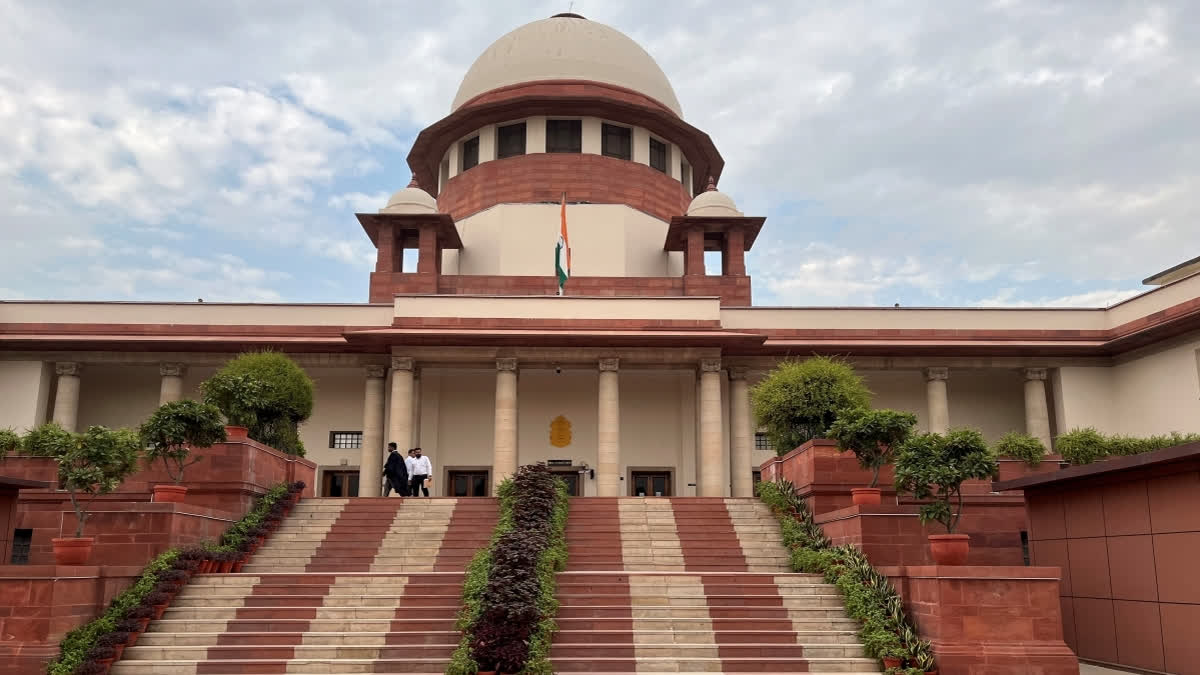New Delhi: The Supreme Court Thursday said a large number of cases (5,175 as of Nov. 2022) are pending against Members of Parliament and Members of the Legislative Assemblies, which have a "direct bearing on our political democracy”, while issuing a slew of directions for speedy disposal of cases against lawmakers.
The apex court emphasized that confidence and trust of the constituency in their political representative, be it an MP or an MLA, is necessary for an interactive, efficient and effective functioning of a parliamentary democracy.
A bench led by Chief Justice of India D Y Chandrachud and comprising Justices P S Narasimha and Manoj Misra noted that there are as many as 5,175 subject cases pending as of November, 2022. Of these, cases that are pending for more than 5 years are as many as 2,116, which is more than 40% of such pendency. “This is a large number. These cases have a direct bearing on our political democracy. Hence, there is a compelling need to make every effort to ensure that these cases are taken up on priority and decided expeditiously," said the bench.
The apex court said that confidence and trust of the constituency in their political representative, be it an MP or an MLA, is necessary for an interactive, efficient and effective functioning of a parliamentary democracy. “However, such confidence is difficult to expect when figures, as indicated..., loom large in our polity”, said the bench.
The bench noted that it has no doubt that even the political representative, be it MP or an MLA, involved in the prosecution would also seek a quick disposal of these cases. “However, the problem lies elsewhere. It seems systemic, perhaps institutional, and takes within its sweep many factors including the method of adversarial litigation that we have adopted. Yet, at every stage of the practice and procedure that we adopt, there is scope for reform. It is in this context that we have earnestly conducted and monitored this case for the last seven years," said the bench.
After analysing the all-India data on the pendency of subject cases in states and union territories, the bench said it has noted a considerable asymmetric disposition between states and even between districts within a State, on factors that have a bearing on early disposal.
The bench noted that there are also variations in the availability of judges to decide the cases, the caseload per judge, the speed at which the cases are decided, the state of physical and technological infrastructure, availability of prosecutors, etc. The bench said the practice and procedure prevalent in every court is distinct and is sometimes deep-rooted, and there are many factors, which may be historical, cultural, regional or linguistic, that influence the work ethic in a court.
Issuing a slew of directions, the apex court said: “Chief Justices of the High Courts shall register a suo-motu case with the title, ‘In Re: designated courts for MPs/MLAs’ to monitor early disposal of criminal cases pending against the members of Parliament and Legislative Assemblies. The suo-motu case may be heard by the Special Bench presided by the Learned Chief Justice or a bench assigned by them”.
“The High Court may issue such orders and/or directions as are necessary for expeditious and effective disposal of the subject cases. The Special Bench may consider calling upon the Advocate General or the Public Prosecutor to assist the Court”, it said.
The apex court said: “The designated courts shall give priority: (i) first to criminal cases against MP’s & MLA’s punishable with death or life imprisonment then to (ii) cases punishable with imprisonment for 5 years or more, and then hear (iii) other cases. The Trial Courts shall not adjourn the cases except for rare and compelling reasons”. Also, the high courts shall create an independent tab on their website providing district-wise information about the details of the year of filing, number of subject cases pending and stage of proceedings, it added.
The apex court judgment came on a plea by advocate Ashwini Upadhyay, which among other things sought a lifetime ban on convicted politicians including sitting lawmakers from contesting elections as opposed to the current six-year ban. The apex court today did not decide on this prayer but only passed directions on expeditious disposal of cases. The plea seeking lifetime ban would be considered later.
Also read:



